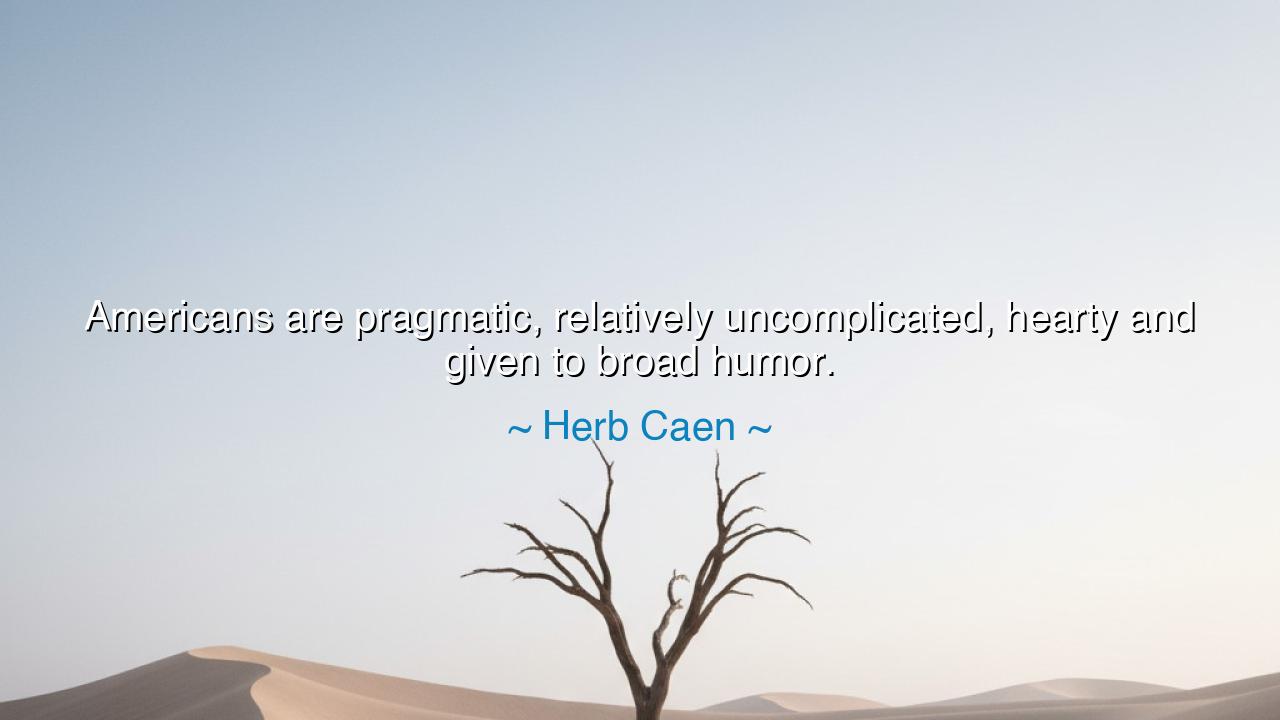
Americans are pragmatic, relatively uncomplicated, hearty and






In the grand unfolding of human civilization, there are certain peoples whose essence shines through in the way they live, speak, and interact with the world around them. The words of Herb Caen—"Americans are pragmatic, relatively uncomplicated, hearty and given to broad humor"—speak to a fundamental characteristic that has shaped the very fabric of the American spirit. In these words, Caen reveals a truth that has been passed down through the ages: the American character is grounded in a practical approach to life, an unwavering simplicity, and an infectious joy that resonates through the culture’s humor. These qualities, though uniquely American in their expression, have deep roots in the ancient wisdom of people who understood that life’s greatness often lies not in complexity, but in the simple truths that connect us all.
In the time of the ancient Greeks, there was a similar understanding of pragmatism—the idea that a person must live with purpose, responding to the world with clear thinking and practical action. Socrates, the great philosopher of Athens, famously said, "The unexamined life is not worth living." Yet, he did not mean that life must be filled with endless contemplation, but that the pursuit of wisdom should lead to action—to living a life of purpose. The Greeks understood that true wisdom lies not in abstraction, but in how one applies that wisdom in the day-to-day realities of life. The Americans, like their ancient predecessors, understood that the world could be navigated with clarity and directness, not with unnecessary complexity or confusion.
The Romans, too, were known for their pragmatic approach to life. Cicero, the great statesman and philosopher, was a model of clear-headed action, and he emphasized the importance of simple, direct thinking in both politics and personal life. The Romans, who built an empire that stretched across the known world, were not obsessed with lofty ideals or abstract philosophy but focused on practicality—on the foundations of law, order, and efficiency. In many ways, the American character, as Caen describes it, is an echo of this ancient Roman spirit. Just as the Romans built their empire on the solid ground of pragmatic thinking, so too do Americans navigate the world with an eye on results and a willingness to act decisively.
In addition to this pragmatism, Caen also speaks of Americans as being hearty, a word that invokes the ancient virtue of fortitude. In the face of adversity, the Americans—like the ancient Spartans—embraced a resilient, enduring spirit. The Spartans, famed for their strength and discipline, lived by a code that emphasized the importance of courage and toughness, not just in battle but in daily life. Herodotus recounts the Spartan king Leonidas and his warriors standing firm at the Battle of Thermopylae, facing overwhelming odds with an unyielding resolve. In this same spirit of hearty endurance, Americans have faced wars, economic challenges, and natural disasters, always rising to meet the challenges with determination and resilience.
Yet, even in the midst of this fortitude, the Americans retained a sense of broad humor—an ability to laugh at the absurdities of life. Humor, after all, is not a sign of weakness, but of strength. The great ancient Romans, renowned for their military might and political power, understood that a light heart could be just as important as a strong arm. Juvenal, the Roman satirist, used humor to expose the corruption and flaws of Roman society, showing that a well-timed jest could hold more power than a sword. The Romans knew that in order to endure the challenges of life, one must also embrace its absurdities—a lesson that Americans, as Caen points out, have taken to heart. In times of crisis, Americans have always found a way to laugh, to lift their spirits with humor, even in the face of great hardship.
The lesson here, then, is one of balance—between pragmatism, fortitude, and humor. Caen’s reflection on the American character teaches us that it is not enough to approach life with solemnity or idealism. To live a full life, one must engage the world with practicality and resolve, but also with a sense of humor that allows us to laugh at the contradictions and challenges we face. Americans, in their spirit of optimism and adaptability, show us that true greatness comes not from perfection, but from the ability to meet life’s trials with an open heart, a clear mind, and a joyful spirit.
In our own lives, we must embrace this balance. Like the ancient Greeks, we should seek to live practically, not burdened by complexity or unnecessary distraction. Like the Romans, we must meet life’s challenges with strength and resolve, always steady in our actions and decisions. But we must also remember the wisdom of the Americans and the ancients before them: life is filled with humor, and it is in that humor that we find the lightness to endure. Let us cultivate this spirit of pragmatism, fortitude, and humor, and in doing so, we will not only face the world with courage but will also be able to laugh as we rise above its trials.






AAdministratorAdministrator
Welcome, honored guests. Please leave a comment, we will respond soon